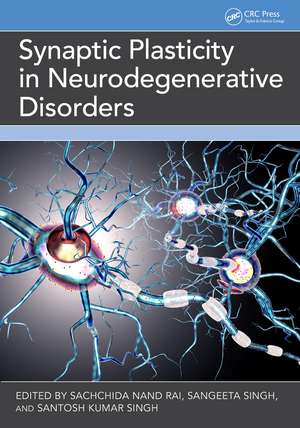Synaptic Plasticity in Neurodegenerative Disorders
Editat de Sangeeta Singh, Sachchida Nand Rai, Santosh Kumar Singhen Limba Engleză Hardback – 24 dec 2024
Preț: 765.86 lei
Preț vechi: 841.61 lei
-9% Nou
Puncte Express: 1149
Preț estimativ în valută:
146.54€ • 153.42$ • 121.26£
146.54€ • 153.42$ • 121.26£
Carte tipărită la comandă
Livrare economică 05-19 aprilie
Preluare comenzi: 021 569.72.76
Specificații
ISBN-13: 9781032735283
ISBN-10: 1032735287
Pagini: 288
Ilustrații: 54
Dimensiuni: 178 x 254 mm
Greutate: 0.7 kg
Ediția:1
Editura: CRC Press
Colecția CRC Press
ISBN-10: 1032735287
Pagini: 288
Ilustrații: 54
Dimensiuni: 178 x 254 mm
Greutate: 0.7 kg
Ediția:1
Editura: CRC Press
Colecția CRC Press
Public țintă
Academic, Postgraduate, and Professional ReferenceCuprins
Chapter 1: General Introduction to Different Neurodegenerative Diseases Chapter 2: Chemical-Induced Parkinson’s Disease Model and Associated Therapeutic Strategies Chapter 3: Recent Advancement in the Treatment of Parkinson’s Disease Cellular Models Chapter 4: Relevance of Genetic Model and Linked Therapeutics in Parkinson’s Disease Chapter 5: Importance of Newer 3D Organoids Model Based Therapeutic Approach in Parkinson’s Disease Chapter 6: Chemical Induced Alzheimer’s Disease Model and Their Therapeutic Significance Along with Limitations Chapter 7: Advancement in the Genetic Model of Alzheimer’s Disease Chapter 8: Organoids and Alzheimer's Disease Chapter 9: Importance of Genetic Model in Huntington’s Disease Chapter 10: Natural Source of Drugs for Neurodegenerative Diseases Chapter 11: Limitations of Modelling in Different Neurodegenerative Diseases Chapter 12: Significance of 3D Organoid Model in Neurodegenerative Diseases Chapter 13: Recent Advancement in Therapeutics of Rare Neurological Disorders Chapter 14: Bio-Informatics Based Modeling in Different Neurodegenerative Diseases and Associated Therapeutic Strategies Chapter 15: Holistic Management of Diverse Neurodegenerative Diseases in Different Translational Models Chapter 16: Gene Therapy, OMICS Approaches, and Translational Neurodegenerative Models: Recent Advancements and Future Perspectives Chapter 17: Implication and Importance of Stem Cell Therapy in a Translational Model of Neurodegenerative Diseases
Notă biografică
Dr. Sangeeta Singh is an Assistant Professor in the Department of Applied Science at the Indian Institute of Informational Technology, Allahabad (IIIT A), Prayagraj, Uttar Pradesh (UP), India. Prior to joining IIIT Allahabad, she worked at the ICAR Indian Veterinary Research Institute in Izzatnagar, Bareilly (UP), India. She completed her Ph.D. in 2010. Dr. Singh's research interests include neurodegenerative disorders and regenerative medicine to promote neuronal repair and regeneration. She has received various research grants from the Science and Engineering Research Board (SERB) and the Department of Science and Technology, India. Dr. Singh has published more than 50 research articles in high-impact journals, in addition to contributing book chapters and conference proceedings. Furthermore, Dr. Singh serves as a reviewer for various reputable journals and is also a Life Member of various esteemed societies, such as the Indian Academy of Neurosciences (India), the Association of Microbiologists of India, and the Society for Biomaterials and Artificial Organs India.Dr. Santosh Kumar Singh is a Senior Scientist at the Centre of Experimental Medicine and Surgery (CEMS), Faculty of Medicine, Institute of Medical Sciences, Banaras Hindu University, Varanasi, India. He earned his Ph.D. from the Botany Department (Institute of Science), BHU, in 1998. In 2003, he served as a Visiting Scientist at the Department of Photosynthesis, Institute of Physical Biology, University of South Bohemia, Czech Republic. Dr. Singh has published more than 75 research articles in high-impact and reputable journals. His research primarily focuses on Drug Discovery and Development, Microbial Biotechnology, and Nanobiotechnology. Dr. Singh is a member of the Mycological Society of India, the Society of Biological Chemists, India, and the Society for Ethnopharmacology, Kolkata, India (SFE INDIA). He has served as a resource person in the Karyashala Training Course under the Accelerate Vigyan Scheme, SERB, and DST. Notably, he was awarded the "National Award for Outstanding Efforts in Science and Technology Communication through Innovative and Traditional Methods (2021)" by the Department of Science and Technology, Ministry of Science and Technology, Government of India. In 2020–2021, he also received the Order of Academic Excellence in Publication from the Institute of Medical Sciences, Banaras Hindu University, Varanasi.Dr. Sachchida Nand Rai is a Research Associate (ICMR RA) at the Centre of Experimental Medicine and Surgery, Institute of Medical Sciences, Banaras Hindu University (BHU), Varanasi. Dr. Rai completed his Ph.D. from the Biochemistry Department (Institute of Science), BHU. Before joining BHU as a Research Associate, he held a post-doctoral fellowship at the Centre of Biotechnology, University of Allahabad, Prayagraj, India. Additionally, he serves as an editorial board member for many renowned journals and has published several research articles in journals of high repute.
Descriere
This book provides a comprehensive overview of the pivotal role of synaptic plasticity in the pathogenesis, progression, and potential treatment of different neurodegenerative disorders. It serves as a valuable resource for researchers, clinicians, and students in neuroscience, computational biology, and neurology.
